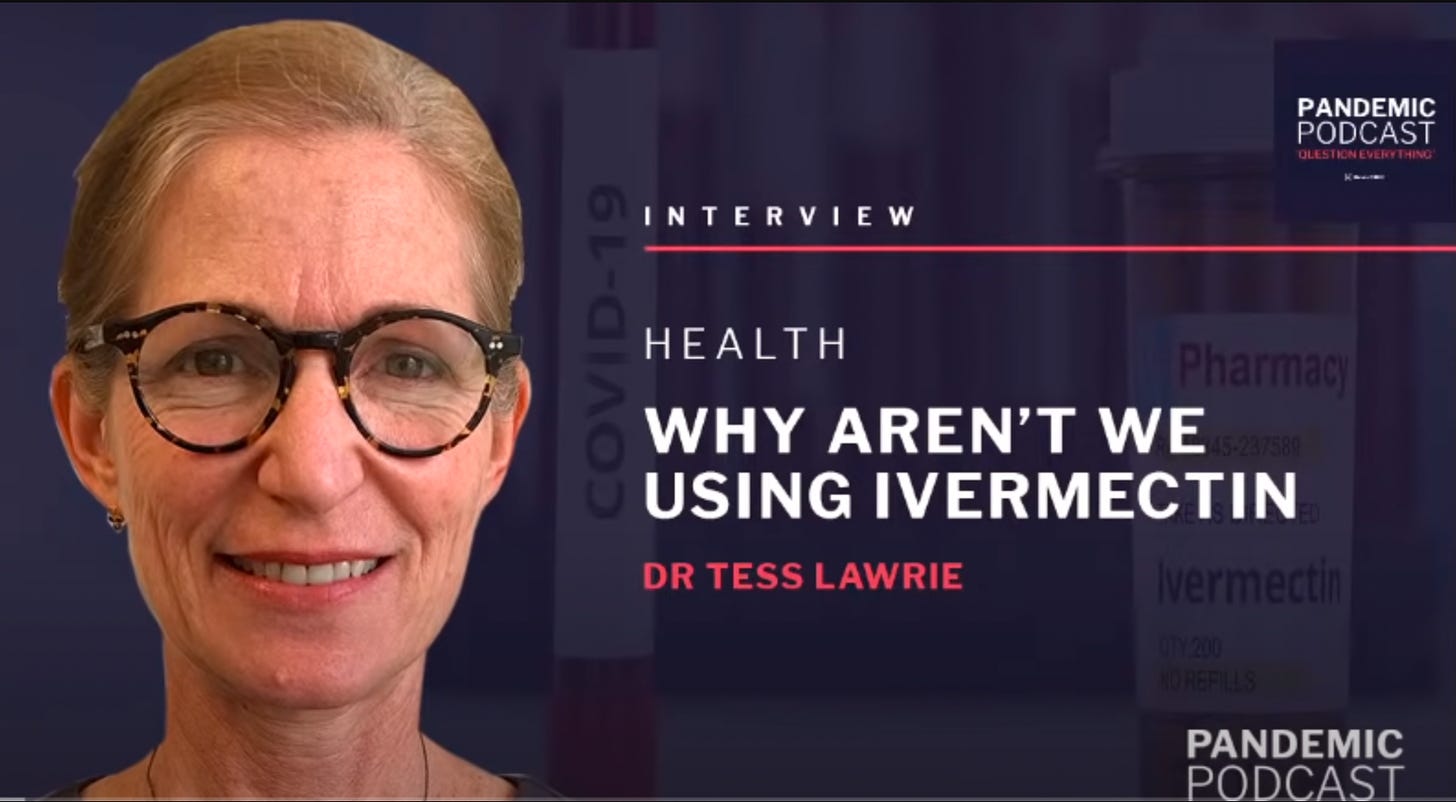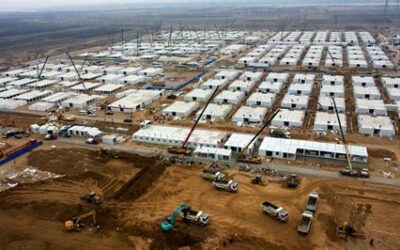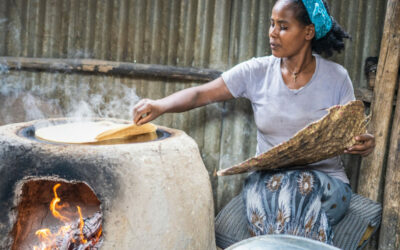Dr Tess Lawrie is a COVID hero with a powerful vision
Be part of building a better future for humanity – it begins here
 |
|
I have never met Dr. Tess Lawrie in person, but the fight for truth and integrity in scientific endeavor has brought us together and today, I consider her an ally at the front line. You may already know Tess. She used to work as a consultant to the WHO, evaluating evidence and developing recommendations. When she saw Dr. Pierre Kory testify before Congress about ivermectin, she gave up her Christmas holiday to run one of these reviews (unpaid) and see if the evidence really did back what Pierre was claiming. It did, so she went to work, writing to health authorities and governments around the world and sharing the great news.
I don’t need to tell you how that went down. Thankfully for all of us, Tess doesn’t give up easily. Since then, she’s worked without a break to get the message about ivermectin and early treatment out to the public. I asked her to write about her experiences in my new book, but you can read her chapter right now on her Substack (worth signing up to, if you haven’t already).
What strikes me most about Tess is her unfailing positivity in the face of darkness. She’s in the trenches with the rest of us, bloodied and bruised, but she’s also one of those smiling and pointing to the dawn. We need people like Tess to remind us that we’re not just fighters, we’re architects of the future. If we want a fairer, kinder world for ourselves and our children, we need to work out what that looks like and how to make it happen. Tess has been busy creating frameworks through which we can start to build this brighter future. She’s part of the team behind World Council for Health, a grassroots initiative offering clear information and guidance on how to stay healthy and live well. Every Monday they have a General Assembly meeting where physicians, scientists and campaigners openly share the kind of information you should be able to get from your government, doctor or media channel, only hell hasn’t frozen over just yet.
Now the World Council for Health is hosting their first conference this May in Bath, UK. Called the Better Way Conference, the event is exclusively focused on finding solutions to the mess we’re in. The US will be strongly represented, with Drs Peter McCullough, Ryan Cole, Richard Urso, Katarina Lindley and also Bret Weinstein and myself will all be there. It’s an opportunity for all of us to take a break from the battle, wash the mud off our faces and get excited about designing new ways of operating that put the health of humanity first.
The conference will consist of seven conversations. I’ll be participating in the first one: Reclaiming Science Together. As you can imagine, I have a few things to say about that. Other conversations will cover managing Covid-19 health consequences, fostering active communities, revolutionizing media, sovereignty, law, justice, and so on. If you’re interested in attending, you don’t have to fly to Bath: online tickets are available soon via the conference website.
We need events like this, and initiatives like the World Council for Health – but they need us too. That’s partly why I’m writing to you today – to ask if you would consider supporting their work by making a financial contribution.
Like so many of us, Tess is operating on a shoestring. Her company, EBMC Squared – home to World Council for Health – is non-profit and relies exclusively on donor funding and a small army of volunteers. They’ve achieved so much already with minimal funds and a lot of goodwill. Now, I’d like to help them get better funded so they can continue their work and do even more. If it moves you to do so, please join me in making a donation.
You can donate directly to support the conference via their website here.
There are many demands on all of us and our resources, so I would not ask if I did not consider this important. If we want a better way, we need to invest in a better way, through our individual efforts and also by supporting projects like this one.
Please feel free to share.
You can donate to the world council of health here.
Medicine, science, bioethics, analytics, politics and life
A Labour of Love – Part 1
My personal account from Dr Robert Malone’s upcoming book
 |
|
Recently, Dr Robert Malone invited me to submit a chapter for his upcoming book “Lies My Gov’t Told Me: And the Better Future Coming”. This is an anthology of personal accounts of the pandemic written by those who, like Dr Malone, have been on the front line of challenging public health policy, often at great personal and professional cost. I am very happy to share my chapter here, with Robert’s blessing. And, I will keep you posted on when Robert’s book becomes available.
Out of adversity and suffering, come transformation and new beginnings. We have all witnessed tremendous darkness in this pandemic, so much loss. And yet, what I have experienced in the last two years has been the revelation of something breathtakingly beautiful to come.
In fact, it seems to me that we are participating in the birthing of a new world. If that sounds lofty and idealistic, bear in mind that giving birth is hard. I say this as a mother, and also as an obstetrician who has had the privilege to attend thousands of births. Even the most easeful, unproblematic birth takes the mother beyond the limit of what she ever imagined her body could do. There’s a reason it’s called labour: it is usually painful, messy and full of blood, sweat and tears.
When news of the pandemic first emerged at the tail end of 2019, I knew in my bones that a great, collective labour was about to begin.
At the time, I was working as a consultant to the World Health Organisation, guiding the development and preparation of WHO antenatal care guidelines. Assessing and evaluating research is my particular area of expertise. So when, on 3 February 2020, the UK government announced funding for an unprecedented six-month plan to develop a coronavirus vaccine, I knew something was up. Vaccines generally take at least at least ten to fifteen years to develop, and these were an entirely new gene technology that had never been successfully implemented.
When I looked into what was being proposed, I couldn’t find sufficient evidence to support the idea that these new types of vaccines could be safely developed and implemented in such a short timeframe.
This was deeply worrying – but not surprising. Time and time again, I have seen new drugs brought into use based on interim findings of pharmaceutical trials, only later to be found of no benefit and potentially harmful. Even so, relying on vaccines at the expense of all other possible solutions seemed like a new level of madness. I could see we were entering dangerous waters with potentially devastating consequences – but what could I do? I wanted so much to help, to inform people, but who would listen to me? I’m not a virologist and while I studied immunology, it isn’t my specialism. Sat in my office in Bath, I felt powerless to stop what seemed like an impending human catastrophe.
Well, if there’s one thing this pandemic has shown me, it is that we are never powerless.
In December 2020, I watched Dr Pierre Kory of the Frontline Covid-19 Critical Care Alliance (FLCCC) testify before the US Senate, stating that, as a treatment for Covid-19, ivermectin was ‘miraculous’. The evidence he presented was compelling, and his clear frustration with the lack of response from the CDC, moved me. Here was something I could help with – I could check his team’s work. I didn’t think twice: between Christmas and New Year, I worked on a rapid systematic review of the 27 studies on ivermectin cited by the FLCCC. Much to my delight, my analysis verified the FLCCC ‘s own findings: ivermectin had a significant impact in preventing and treating infection, and in reducing deaths. There was no time to waste. On 3rd January 2021, I sent an urgent correspondence to our UK Health Secretary Matt Hancock as well as other UK members of Parliament and the WHO and awaited a response. Days passed, deaths kept coming, I received no reply. I couldn’t sit idly so I did something completely out of character. I created a three-minute video, appealing to UK Prime Minister Boris Johnson to include ivermectin in Covid-19 prevention and treatment, and to start saving lives.
Still, no response. At around the same time, I was encouraged to learn that another researcher was on the same track. Dr Hill, a virologist at University of Liverpool, had been commissioned by the WHO and Unitaid to do a review on ivermectin. On 5 January 2021, Dr Pierre Kory introduced us, and I found Dr Hill as enthused as any of us about ivermectin’s efficacy: in his review, he’d found that in six randomised control trials (RCTs) of moderate or severe infection, there was a 75% reduction in mortality with ivermectin treatment. In my conversations with him, he was clear that he wanted to get ivermectin approved as quickly as possible.
On 13 January 2021, having received no word from the UK Government, I presented my rapid review findings to twenty doctors, scientists and other professionals from several countries. The consensus from this meeting was that the evidence was compelling, and I was asked to put these findings into documentation that could be presented to health agencies around the world. So, I put together a team of expert reviewers and invited Dr Hill to collaborate with us in producing a Cochrane systematic review.
In a world where lives matter more than money or ambition, we would have united in our efforts, governments would have listened, ivermectin would have been approved and countless lives would have been saved. However, that world is still in the process of being born – and in early 2021, labour had only just begun. What actually happened, is this: Dr Hill did not join us. Instead, despite his exciting findings about ivermectin’s efficacy, he published a low-quality preprint of his WHO-commissioned review, with a conclusion advising that “larger, appropriately controlled randomised trials are needed before rigorous evaluation of the clinical benefits of ivermectin can be undertaken.”
This was extraordinary and damaging. To put this into context, randomised trials usually take years to complete. At the time, and as acknowledged by Dr Hill, 15,000 people were dying every day. His findings – that there was a 75% reduction in mortality with ivermectin treatment – were unchanged. So, in presenting this conclusion, he was potentially preventing hundreds of thousands from accessing life-saving treatment. Why this devastating u-turn? I emailed him, asking him to retract his preprint and inviting him once again to collaborate with us. He asked to speak with me on a video call where he effectively admitted being under pressure from his funding source – Unitaid – to alter his conclusion. I was shocked: he was apparently prepared to let people die for a period of six weeks – the end of February was when he estimated health agencies would say “enough is enough” – to appease his sponsor.
Much has been written about this episode. Almost a year later, when I shared the video of our call where he made this admission, many were shocked by Dr Hill’s willingness to sit on his hands – understandably so. But Dr Hill is not alone. His actions are symptomatic of a broken system where science is manipulated for profit and people are all too often collateral damage.
Appalled but undeterred, I and my team got to work on producing the Cochrane review. In my first rapid review, I’d included high quality observational studies. This time, we focused exclusively on randomised control trials and took a highly conservative approach. Still, the results pointed to ivermectin being highly effective in the prevention and treatment of Covid-19. On 20 February, along with a UK-based Steering Committee, I held a WHO-style guideline development meeting with 65 doctors, scientists and other stakeholders from 15 countries, the overwhelming majority of whom voted to recommend ivermectin for both prevention and treatment of Covid-19.
We sent the Evidence-to-Decision Framework with the recommendation to regulatory bodies in the UK, USA, South Africa, Canada, Australia, and many other countries. We had a team frantically emailing people and received countless emails back from medical professionals asking us to help them get the message to the authorities. And yet, no matter how hard we tried to reach out, we couldn’t make any headway. No politician or health agency wanted to meet us or read our recommendation.
It was dismaying. Here we were, with proof of effective early treatment protocols that included safe, repurposed drugs such as ivermectin. These protocols were saving lives – but not only did health agencies ignore them, some even set out to prevent them from being used at all.
If ever there were an indication that scientific research and the system of government and regulatory oversight is broken, this was it.
Of course, I’d always suspected that these systems, and in particular the WHO, were compromised by private interests. Still, I hoped that in the face of dire need, in the midst of a pandemic, doing the right thing for humanity would win out against political agenda and profit. Sitting in my office, checking emails, watching politicians and the WHO exhort people to get their vaccinations with the completely unverified promise they were ‘safe’, knowing there was a better option that really was safe, knowing that people within governments knew this too – and worst of all, seeing people comply without question – was horrifying. And in the wake of the vaccine roll-out came the emails: pleas for help from people experiencing adverse reactions and injury, people their doctors were unwilling to see, let alone treat. These came on top of the constant stream of emails from people asking for help in supporting a loved one in hospital with Covid-19, people who knew the treatment they were receiving was inadequate and had nowhere else to turn.
So much darkness – and in all this darkness, a reckoning. Once and for all, Covid-19 laid bare the true extent of corruption within the research world, and its impacts. It is ironic that Dr Hill should have recommended more large RCTs in his conclusion. These are supposedly the gold standard, yet their integrity has become degraded by the ever-increasing requirements for conducting RCTs – requirements that favour big pharma. As I mentioned, these trials take months and they also cost millions, such that only private industry can afford to undertake them. Since there’s very limited (if any) independent oversight, it is easy for pharmaceutical companies to design trials in a way that guarantees the conclusion they want. Those who design the trials and control the data, also control the outcome. It’s common that early trial findings showing benefit leading to the drug’s approval are contradicted by later evidence showing no benefit. This is how an entirely new and expensive drug like remdesivir can gain authorisation as a treatment for Covid-19, even before trials are completed and with no safety record – while a safe, established, cheap medicine like ivermectin is buried under the altar of big profit. As anticipated, remdesivir now appears to be both ineffective and harmful as a Covid-19 treatment.
The suppression of ivermectin for Covid-19 highlighted the extent to which our collective trust in the authorities was misplaced. Had ivermectin been employed early, in response to the findings of the FLCCC, I do not believe there would have even been a pandemic. Here we come to the nub of the matter.
Illness is big business. This is why we’ve ended up with a healthcare system focused almost exclusively on managing disease rather than supporting health. Many traditional healing modalities focus on optimising health so that disease never occurs in the first place. In the medical mainstream, we wait for people to fall ill before taking action. Indeed, most of the tools available to doctors focus on treating disease, not preventing it. Why is that? Because there’s no money in keeping people well. It is in the interests of big pharma to keep people sick, developing drugs that have their own side effects that in turn need treating with more drugs, and so on and so on.
Perhaps this viewpoint seems extreme coming from a data-driven medical research scientist. But it’s precisely because I’m data-driven that I’ve reached this conclusion. Just look at what we’ve been through in the past two years: repeated rejection of safe, effective treatments in favour of expensive, new and riskier drugs that have left many with severe injuries that will require lifelong treatment. Consider the many young people who developed myocarditis following vaccination and who will now have to take heart meds for the rest of their lives. They were once healthy and had no risk from Covid. Now, they are a captive client of big pharma. How could anyone knowingly inflict this on the young?
This pandemic has revealed to all of us how far we have strayed from what makes us human. Centuries of conditioning have led us to forget who we are and how we naturally thrive. That’s why so many of us are unable to recognise what is good for us and what causes harm. We eat food that’s toxic to the body, we skip exercise to sit in front of the TV and absorb whatever content programmers decide we should absorb. We accept untested gene therapies into our bodies because we trust corrupt leaders more than we trust ourselves. We are ever more isolated from each other, never more so than now, and we forgo hugs and smiles and impose the same cruelties on our children. We may be born in love, but we are weaned on fear and we are now so conditioned, that we are afraid of living.
The alienation of humans from themselves has reached an apogee – and great change is needed.
To be continued. Stay tuned for part 2 next week.
Subscribe to A Better Way to Health with Dr Tess Lawrie
Sharing insights into my work and vision










0 Comments